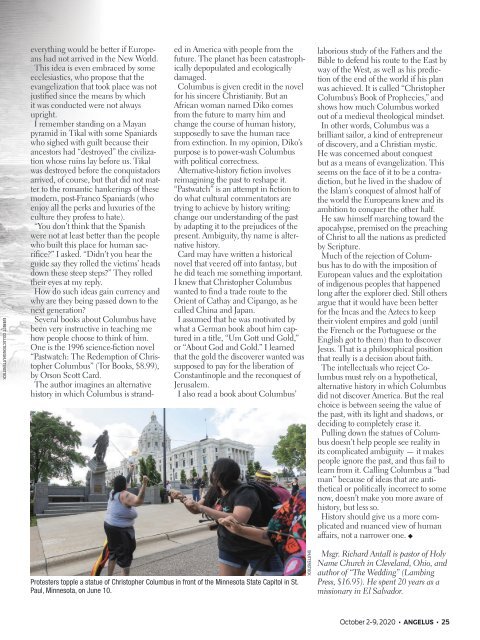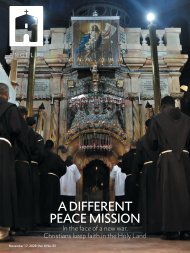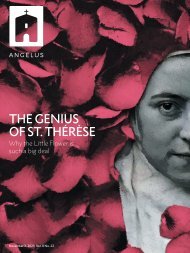Angelus News | October 2-9, 2020 | Vol. 5 No. 25
A statue of the Virgin Mary in the cemetery area of St. Andrew’s Abbey in Valyermo stands as the Bobcat Fire burns in the nearby San Gabriel Mountains Sept. 16. Starting on Page 10, local Catholics — including the monks at St. Andrew’s — share how the same fires that threatened their homes have helped strengthen their faith.
A statue of the Virgin Mary in the cemetery area of St. Andrew’s Abbey in Valyermo stands as the Bobcat Fire burns in the nearby San Gabriel Mountains Sept. 16. Starting on Page 10, local Catholics — including the monks at St. Andrew’s — share how the same fires that threatened their homes have helped strengthen their faith.
Create successful ePaper yourself
Turn your PDF publications into a flip-book with our unique Google optimized e-Paper software.
Columin<br />
the<br />
1492.<br />
EVERETT COLLECTION/SHUTTERSTOCK<br />
everything would be better if Europeans<br />
had not arrived in the New World.<br />
This idea is even embraced by some<br />
ecclesiastics, who propose that the<br />
evangelization that took place was not<br />
justified since the means by which<br />
it was conducted were not always<br />
upright.<br />
I remember standing on a Mayan<br />
pyramid in Tikal with some Spaniards<br />
who sighed with guilt because their<br />
ancestors had “destroyed” the civilization<br />
whose ruins lay before us. Tikal<br />
was destroyed before the conquistadors<br />
arrived, of course, but that did not matter<br />
to the romantic hankerings of these<br />
modern, post-Franco Spaniards (who<br />
enjoy all the perks and luxuries of the<br />
culture they profess to hate).<br />
“You don’t think that the Spanish<br />
were not at least better than the people<br />
who built this place for human sacrifice?”<br />
I asked. “Didn’t you hear the<br />
guide say they rolled the victims’ heads<br />
down these steep steps?” They rolled<br />
their eyes at my reply.<br />
How do such ideas gain currency and<br />
why are they being passed down to the<br />
next generation?<br />
Several books about Columbus have<br />
been very instructive in teaching me<br />
how people choose to think of him.<br />
One is the 1996 science-fiction novel<br />
“Pastwatch: The Redemption of Christopher<br />
Columbus” (Tor Books, $8.99),<br />
by Orson Scott Card.<br />
The author imagines an alternative<br />
history in which Columbus is stranded<br />
in America with people from the<br />
future. The planet has been catastrophically<br />
depopulated and ecologically<br />
damaged.<br />
Columbus is given credit in the novel<br />
for his sincere Christianity. But an<br />
African woman named Diko comes<br />
from the future to marry him and<br />
change the course of human history,<br />
supposedly to save the human race<br />
from extinction. In my opinion, Diko’s<br />
purpose is to power-wash Columbus<br />
with political correctness.<br />
Alternative-history fiction involves<br />
reimagining the past to reshape it.<br />
“Pastwatch” is an attempt in fiction to<br />
do what cultural commentators are<br />
trying to achieve by history writing:<br />
change our understanding of the past<br />
by adapting it to the prejudices of the<br />
present. Ambiguity, thy name is alternative<br />
history.<br />
Card may have written a historical<br />
novel that veered off into fantasy, but<br />
he did teach me something important.<br />
I knew that Christopher Columbus<br />
wanted to find a trade route to the<br />
Orient of Cathay and Cipango, as he<br />
called China and Japan.<br />
I assumed that he was motivated by<br />
what a German book about him captured<br />
in a title, “Um Gott und Gold,”<br />
or “About God and Gold.” I learned<br />
that the gold the discoverer wanted was<br />
supposed to pay for the liberation of<br />
Constantinople and the reconquest of<br />
Jerusalem.<br />
I also read a book about Columbus’<br />
laborious study of the Fathers and the<br />
Bible to defend his route to the East by<br />
way of the West, as well as his prediction<br />
of the end of the world if his plan<br />
was achieved. It is called “Christopher<br />
Columbus’s Book of Prophecies,” and<br />
shows how much Columbus worked<br />
out of a medieval theological mindset.<br />
In other words, Columbus was a<br />
brilliant sailor, a kind of entrepreneur<br />
of discovery, and a Christian mystic.<br />
He was concerned about conquest<br />
but as a means of evangelization. This<br />
seems on the face of it to be a contradiction,<br />
but he lived in the shadow of<br />
the Islam’s conquest of almost half of<br />
the world the Europeans knew and its<br />
ambition to conquer the other half.<br />
He saw himself marching toward the<br />
apocalypse, premised on the preaching<br />
of Christ to all the nations as predicted<br />
by Scripture.<br />
Much of the rejection of Columbus<br />
has to do with the imposition of<br />
European values and the exploitation<br />
of indigenous peoples that happened<br />
long after the explorer died. Still others<br />
argue that it would have been better<br />
for the Incas and the Aztecs to keep<br />
their violent empires and gold (until<br />
the French or the Portuguese or the<br />
English got to them) than to discover<br />
Jesus. That is a philosophical position<br />
that really is a decision about faith.<br />
The intellectuals who reject Columbus<br />
must rely on a hypothetical,<br />
alternative history in which Columbus<br />
did not discover America. But the real<br />
choice is between seeing the value of<br />
the past, with its light and shadows, or<br />
deciding to completely erase it.<br />
Pulling down the statues of Columbus<br />
doesn’t help people see reality in<br />
its complicated ambiguity — it makes<br />
people ignore the past, and thus fail to<br />
learn from it. Calling Columbus a “bad<br />
man” because of ideas that are antithetical<br />
or politically incorrect to some<br />
now, doesn’t make you more aware of<br />
history, but less so.<br />
History should give us a more complicated<br />
and nuanced view of human<br />
affairs, not a narrower one. <br />
Protesters topple a statue of Christopher Columbus in front of the Minnesota State Capitol in St.<br />
Paul, Minnesota, on June 10.<br />
SHUTTERSTOCK<br />
Msgr. Richard Antall is pastor of Holy<br />
Name Church in Cleveland, Ohio, and<br />
author of “The Wedding” (Lambing<br />
Press, $16.95). He spent 20 years as a<br />
missionary in El Salvador.<br />
<strong>October</strong> 2-9, <strong>2020</strong> • ANGELUS • <strong>25</strong>


















